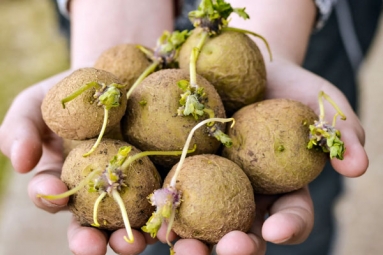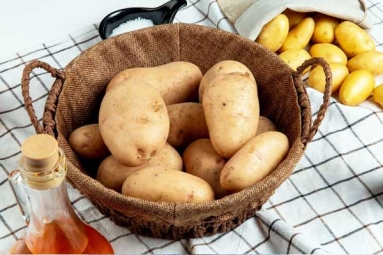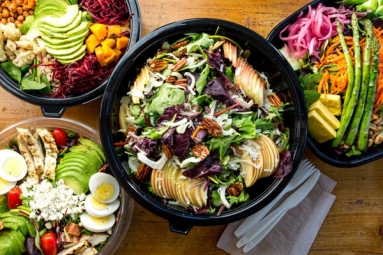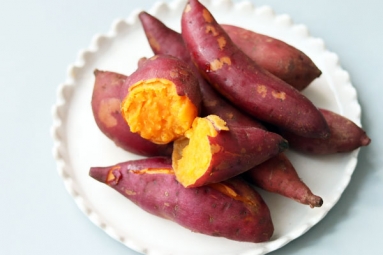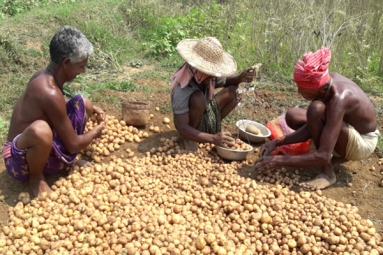
(Image source from: Canva.com)
In conversations about food, potatoes usually get a bad reputation. They are often grouped with "bad carbs," accused of causing weight gain, criticized in talks about diabetes, and removed from many diet plans. Online posts compare potatoes to so-called superfoods, leading most Indian people, regardless of where they come from, to feel ashamed when they treat themselves to aloo paratha or aloo posto. However, research presents a different perspective. Potatoes are full of nutrients, fiber (especially when the skin is left on), and certain types of starch that can be good for gut health and help control blood sugar when prepared properly. Therefore, potatoes as a food item or a member of the tuber family are not harmful to your overall health. Here are all the reasons you need to understand why this is true, along with a deeper analysis of how unhealthy cooking methods are truly the problem.
Potatoes are more than just starch. As stated by Harvard Health, potatoes have significant amounts of potassium, vitamin C, vitamin B6, and some dietary fiber, mainly found in the skin. A study called Perspective: Potatoes, Quality Carbohydrates, and Dietary Patterns describes potatoes as a "high-quality" carb when considered correctly, suggesting that the negative view of potatoes often comes from relying too much on the glycaemic index (GI) and misinterpreting some studies. What sets potatoes apart is that their glycaemic index can change. It greatly depends on the potato type and how it's cooked. In research on North American potatoes, scientists discovered GI values ranging from 56 to 94 based on the preparation method, like boiling, baking, or reheating. For example, when potatoes are prepared ahead of time and then cooled, a process that increases resistant starch, it lowers blood sugar responses after eating. Another study with cooled potatoes showed that women with high fasting glucose levels had a lower glycaemic and insulin response with chilled potatoes (which have more resistant starch) compared to fresh ones.
Resistant starch (RS) is a type of carbohydrate that is not broken down in the small intestine but instead is fermented in the colon. It produces several beneficial effects through the gut microbiome and byproducts of fermentation. Another study with "new resistant potato starches" (RS4) showed lower blood sugar spikes after meals and higher feelings of fullness compared to regular starches. Nevertheless, the findings are not consistent. A randomized study in 2020 on RS2 supplementation in prediabetic adults did not show significant changes in feelings of fullness, food consumption, or hunger. A recent review of 22 studies found no definite proof that RS consistently makes people feel fuller or reduces their food intake. Still, one thing is clear: how you cook, cool, and change the type of starch in potatoes can alter their effects on metabolism.
A study from 2019 looked at how eating different amounts of potatoes influenced weight gain and food consumption in animals. It found that feeding animals more potatoes led to more weight gain in certain situations. Additionally, trials involving humans taking resistant starch supplements for about eight weeks showed a small but important average weight loss of about 2.8 kg, along with better insulin sensitivity among those who were overweight or obese. A review titled Resistant Starch and Energy Balance discusses research on resistant starch, suggesting it might help lower calorie intake, boost fat burning, and have a slight effect on body makeup. However, the outcomes depend on factors like the amount consumed, how long it is taken, and each person's unique metabolism. Much of the concern regarding potatoes comes from observational studies, but more recent data from larger groups have clarified this issue.
In a significant analysis published in 2025, researchers tracked 205,107 people over several years, noting that 22,299 developed type 2 diabetes. They discovered that consuming three servings of French fries per week was linked to a 20% increased risk of developing diabetes, whereas eating baked, boiled, or mashed potatoes did not show a significant risk after considering body mass index and other variables. They also examined the impact of swapping foods: replacing three servings of potatoes weekly with whole grains was thought to reduce diabetes risk by 8% for total potatoes, 4% for baked, boiled, or mashed potatoes, and 19% for French fries. Commentary from Harvard mentions that the risk related to potatoes largely depends on how they are cooked. The takeaway is that the cooking method and what foods they are swapped with are more important than simply labeling them as "good or bad."
Earlier research has also linked potato consumption, especially fried potatoes, to a higher risk of type 2 diabetes. For instance, the Halton et al. Nurses' Health Study found stronger links with French fries compared to boiled potatoes, particularly after factoring in body mass index. Based on this evidence, some practical insights about potatoes can be drawn:
The potato itself, when boiled, baked, or cooled to increase resistant starch, is not necessarily harmful and may be easier for the body to handle.
Frying, adding unhealthy fats, and combining with processed carbohydrates change potatoes from being safe to potentially harmful.
How much you eat, the type of potato you choose, cooling and retrogradation, as well as what you eat with it (like fiber and protein), affect how potatoes influence sugar levels and weight.
Replacing fries with whole grains can significantly lower the chance of developing type 2 diabetes, according to research findings.
Based on this information, here are some simple tips for including potatoes in a healthier and balanced diet:
Boil, Bake, Steam, Chill: Choose cooking methods that reduce added fat and boost resistant starch (let them cool after cooking).
Eat With Skin On: The skin of the potato adds fiber and nutrients.
Watch Portion Sizes: A single medium potato is usually enough; avoid too much.
Pair Wisely: Eat with legumes, vegetables, or protein to slow down the sugar response.
Avoid Fried Options: Fries, chips, and other fried potato foods are linked to higher metabolic risks.
Use Variety And Rotation: Swap with whole grains, millets, or other tubers like sweet potatoes for more variety.
Use Substitution Wisdom: Replace fried or high-potato dishes with whole-grain or legume meals to minimize long-term risk.
Potatoes have been wrongly labeled as unhealthy. Research shows that the potato itself is not the problem; poor cooking methods, large portions, and unhealthy combinations are. When prepared by boiling, baking, or cooling, eaten in smaller portions, and paired wisely, potatoes can be part of a healthy, balanced diet. The message should change from "potatoes are bad" to "prepare them better, pair them smartly, and watch your portions." Let’s change the perception of potatoes from being seen as a bad choice to being a versatile, healthy food that you can enjoy without feeling guilty.




